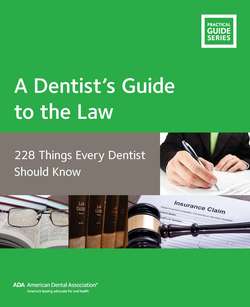Читать книгу A Dentist’s Guide to the Law - American Dental Association - Страница 32
На сайте Литреса книга снята с продажи.
17. What Is There About a Corporation That Would Make Me Want To Incorporate My Practice?
ОглавлениеAt least theoretically, incorporation is a way to reduce certain legal exposures. A corporation offers the owners of the practice (its shareholders) the ability to separate themselves legally from its operation. These shareholders invest the required start-up capital to get the business running, and the board of directors they elect, who in turn appoint the officers, who in turn are responsible for the day-to-day operations as well as important strategic decisions for this new legal entity, the corporation. As a practical matter, the shareholders, directors, and the officers will be by and large the same persons, at least in all but very large associations. Nonetheless, flexibility is possible with this arrangement. The new dentist who starts as an associate may “buy in” and become a shareholder after some years as a valuable contributor to the practice, but might not be quite ready to assume the same management responsibilities as the founding dentist. So perhaps the associate might become an officer, but not a director.
Because a corporation is a separate legal entity distinct from its shareholder(s), an important advantage of a corporation over the other formats discussed above is that all shareholders have limited liability. In other words, the corporation itself, not the shareholders that own it, is held legally liable for the actions and debts the business incurs, except in the case of fraud or malfeasance. This limited liability can be comforting to a group of dentists entering a fifteen-year lease, or purchasing $1 million of new equipment. (Note, however, that a bank from which the group may seek financing for that equipment purchase will likely ask for personal guarantees as to any significant loan, defeating the theoretical “limited liability” a corporation structure affords, at least for that transaction.)
At least theoretically, incorporation is a way to reduce certain legal exposures. A corporation offers the owners of the practice (its shareholders) the ability to separate themselves legally from its operation.
A “C” corporation may be less desirable from a tax perspective because there are two layers of tax — the corporation pays tax and after the corporate income tax is paid on the business income, any distributions made to stockholders are taxed again at the stockholders’ tax rates as dividends. Income paid to shareholders as wages are also taxed on the shareholder’s personal income tax return.
Alternatively, the corporation may be able to make an “S” corporation election. An S corporation is often more attractive to small business owners than a C corporation because an S corporation has some appealing tax benefits and still provides business owners with the liability protection of a corporation. With an S corporation, income and losses are passed through to shareholders and included on their individual tax returns, similar to a partnership, resulting in one level of federal tax to pay. S corporations also have limitations as to who can be a shareholder.
One real tax advantage of forming a corporation is the ability to establish fringe benefit programs in a tax-favored manner. These include medical plans, to a limited extent, retirement plans, and some withholding tax advantages when dealing with employees. The availability of these tax-favored fringe benefits is typically what drives the decision to incorporate. Tax-favored fringe benefits, combined with flexibility in structuring the business relationship among the participants; a greater ability to establish buy-out arrangements among the parties; and a certain legitimacy or successful air that is associated with being organized as a corporation — particularly a professional corporation — all point to why many dental groups ultimately choose to be organized as corporations. It should be noted that many states specifically require an incorporated health care professional to be formally structured as a “professional corporation,” or “PC” or “SC.” You will need to consult an attorney in your state to determine local requirements.
One real tax advantage of forming a corporation is the ability to establish fringe benefit programs in a tax-favored manner. These include medical plans, to a limited extent, retirement plans, and some withholding tax advantages when dealing with employees.
With these advantages come some negatives that must be considered. A corporation generally involves more maintenance tasks and expense of operation than the other entities mentioned above (although a limited partnership involves many of the same maintenance tasks and expenses as a corporation). A corporation must be registered with the state; annual reports are required; meetings must be held and records of same kept; and a bookkeeper is often necessary to maintain the necessary books and records. Not only must a separate tax return be filed, but corporate-level taxes may have to be paid. For those reasons, the new dentist will frequently defer forming a corporation for a period of time.
